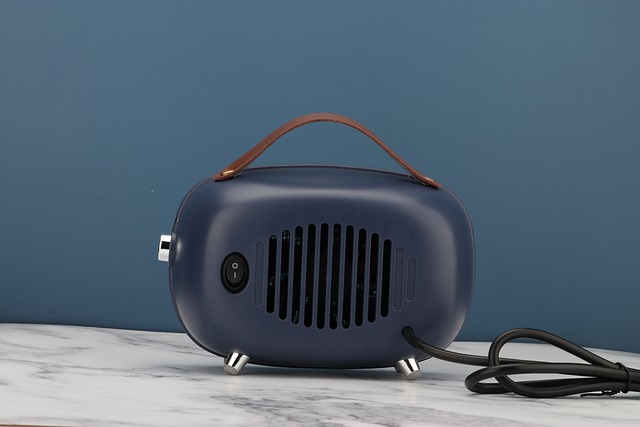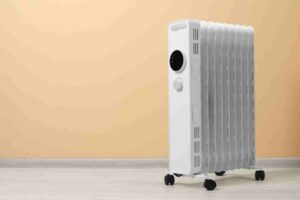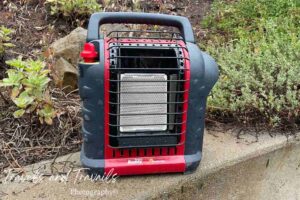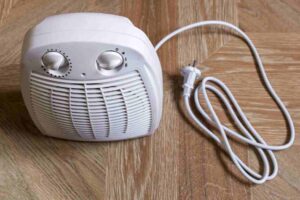RV camping doesn’t have to stop in the autumn and winter. You just need gear suitable for withstanding the chill, such as a heater. How do you choose between electric and propane heaters?
Electric and propane heaters have advantages and disadvantages for camping. Propane burns clean, but fuel is expensive, and lugging around the canisters is inconvenient. Electric heaters produce consistent, prolonged heat but take longer to warm up. They’re also not conducive for remote camping.
This guide will compare the two types of heaters, divulging their upsides and downsides. By the time you’re done reading, you’ll feel confident proceeding with a purchasing decision so you can stay cozy and warm in your camper all season long!
Preppin’ for Winter with Propane – What Is a Propane Heater and How Does It Work?
Let’s begin by discussing propane heaters, arguably the most popular type among campers and motorhome owners.
A propane heater utilizes a piezoelectric igniter. Crystal quartz or ceramic within the heater receives pressure, which pushes a hammer on a spring to start a spark. The spark ignites the propane.
Your motorhome will feel noticeably warmer as long as the fuel in the tank continues to burn. When it empties, you must load another propane canister into the heater, or the cool air will fill your RV, leaving you shivering.
A little bit of propane goes a long way. You can get 10 hours of use out of a 20-pound cylinder burning at 4,000 British thermal units or BTUs an hour.
Portable propane heaters require smaller propane loads. These wheeled heaters can easily travel from one part of your RV to another.
Some propane heaters must be mounted to the ceiling or wall and will include the required attachment points, but most are designed for life on the go.
A portable propane heater also has a self-contained propane tank. This prevents the tank from falling out of the heater and causing damage, making these heaters safe.
No Chills Here – Electric Heater Operation and Subtypes

If not a propane heater, you’ll select an electric one for your cold-weather camping needs.
Electric heaters are effortless to use. Rather than loading in propane tanks, plug the heater in. The internal elements generate an electric charge, and that current converts into heat via the heating element, which is an electrical resistor.
That’s the gist of how electric heaters work, but their operation isn’t the same from subtype to subtype. Here’s what you need to know.
Micathermic Heaters
A micathermic heater is a small, portable space heater. Mica covers the heating element. The silicate minerals that comprise the mica help this heater produce radiant and convection heat.
Let’s explain the difference. Radiant heat is a type of heat energy caused by environmental radiation, such as when you turn on a stovetop and feel the heat emanating from it. Convection heat is a form of heat transfer that relies on fluid to move the heat.
Micathermic heaters have a streamlined shape and design, making them especially recommended for campers and small motorhomes.
Ceramic Heaters
The next type of electric heater is ceramic. The internal fan within spins rapidly to disperse the warm air. You will feel the warmth quickly, but these are not the most energy-efficient type of electric heaters.
Ceramic heaters also aren’t quiet, so each time they start and stop, you’ll hear it.
A ceramic heater includes metal coils and ceramic plates. The coils are connected to the plate and receive electricity when you plug in your heater and turn it on. The metal coils will warm up the ceramic plates, which absorb heat.
The heat is then released.
Oil-Filled Heaters

Here’s a type of electric heater that uses radiant heat: an oil-filled heater. Also known as a column heater, this radiator-like space heater is designed with cavities and columns. Diathermic oil warms up and travels across those columns. The heater begins producing warmth.
Oil-filled heaters plug right into any available electrical outlet in your RV. They’re tall and narrow, making them another appropriate choice for smaller motorhomes. Many portable oil-filled heaters have wheels.
Using much less energy than ceramic heaters, oil-filled heaters can turn off and still produce heat for a while. However, keeping them secure when driving your RV is challenging, and someone who touches the heater could get burned.
Infrared Heaters
The last type of electric heater to go on your shortlist is the infrared heater. Within the heater is an emitter that reaches high temperatures. It sends energy toward an adjacent object that’s much cooler using electromagnetic radiation.
Since these heaters produce infrared radiation, they do more than warm the air. They will heat up your motorhome, including the nearby walls, floors, and furniture.
Propane Heaters for Camping – The Pros and Cons

Now that you understand how a propane heater works, let’s review the benefits and disadvantages of this technology.
Pros
- Boondocking-Friendly
A propane heater doesn’t need any outlets in your motorhome. It’s a self-contained heater that requires a spark to begin generating warmth. You can boondock out in the middle of nowhere and enjoy consistent heat without being hooked up.
Propane heating enables you to take your RV adventures further, exploring new corners of the world.
- Different Tank Capacities
Propane canisters aren’t a one-size-fits-all solution. They’re available in different sizes commensurate to the heater. You can’t overstuff a canister that’s too big for your heater in there, but you can select from a few sizes.
- Burns for Hours
You’ll recall that 20 gallons of propane can burn for 10 hours. While portable heaters won’t have the same capacity, you should get several consistent hours of use, enough to keep you toasty warm for an afternoon or overnight.
- Safe to Use
When burning it in an enclosed environment like your camper, you might worry about the risk of fumes being released from the propane heater. While that’s a fair concern, today’s propane heaters are nontoxic and won’t produce deadly fumes in the air where you, your friends, family, and pets are. Phew!
- Burns Clean
Another concern you might have is for the environment. While not the greenest heating solution, propane burns clean, so you don’t have to unnecessarily stress about your carbon footprint when camping during the winter this year.
Cons
- Large Tanks Are Heavy and Unwieldy
Propane canisters aren’t fun to lug around in your RV. They’re heavy and can easily tip over and roll across the vehicle. If they get dented or dinged on the way, they can leak, causing a catastrophic issue as propane spills all over your floors.
- Storing Propane Tanks on an RV Can Affect Weight Distribution
Do you like to stock up on supplies so you don’t have to make unnecessary stops when traveling in your camper? Buying too many heavy items at once–such as large jugs of water or canisters of propane–and storing them all in one corner of your camper can affect the weight distribution.
Uneven pressure wears half the axles, which become likelier to fail, putting you in a dangerous predicament.
- Continual Expense
A portable propane heater might not be initially very expensive, but you don’t only pay for this heating solution once. You must keep stocking up on propane canisters to stay warm, which means spending hundreds if not thousands of dollars over the life of your heater.
Electric Heaters for Camping – The Pros and Cons

Next, let’s assess the plusses and minuses of electric heaters.
Pros
- Plugs Into an Available Outlet
It’s easy to use an electric heater, as it requires no installation. Some might mount to the wall of your motorhome, but most plug right into any outlet you have handy. That makes it easy and convenient to use an electric space heater immediately.
- Doesn’t Require Fuel
Fuel where? Not here! Unless yours is an oil-burning electric heater, all use various sources of heat and electricity to work. You don’t have to stress about fuel spills and pouring in just the right amount.
- Comes in Several Types
The various styles of electric heaters give you versatility. You can select a type based on features, operation, efficiency, size, and price, buying the ideal space heater for your cold-weather adventures.
- No More Heavy Jugs of Propane
Your days of carrying propane canisters are over when you select an electric heater for camping. You won’t have the weight distribution concerns described above, nor will you risk propane leaks. You can warm your motorhome with far less stress.
- Single-Time Expense
Here is arguably the biggest benefit of an electric heater: no continued costs! You’ll pay for your heater once, then only have to replace it when it breaks. Technically, you’re paying for electrical hookups at a campsite, but you were probably going to do that anyway.
Cons
- Take Longer to Warm Up
Propane heaters will begin generating heat much faster than electric heaters. Their internal elements take time to warm, and then that heat must be distributed from the heater to the rest of your vehicle. You’re left shivering in the interim.
- Not Boondocking-Friendly
Electric heaters aren’t battery-powered. They must plug in, or they don’t work. Boondocking doesn’t use hookups, including electrical hookups. That can leave you in the lurch, as you won’t have an electric heater to depend on.
The Verdict
Now, it’s decision-making time. Electric and propane heaters each have their advantages, so you’ll have to consider several factors when choosing.
For example, do you plan on boondocking or using shore power? That makes your decision simple, as you can’t use an electric heater when out in the middle of nowhere.
Here’s another question to ask – how cold is it? If you need heating ASAP, a propane heater will generate it, whereas an electric heater will warm up your motorhome eventually, but certainly not immediately.
Did this guide help you choose between an electric or propane heater for your camper or RV? Let me know in the comments below!
